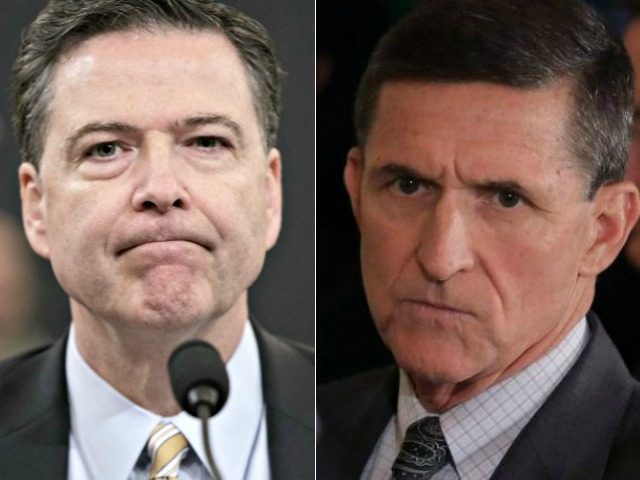In a Friday letter to Deputy Attorney General Rod Rosenstein and FBI Director Christopher Wray, Senate Judiciary Committee Chairman Charles Grassley (R-IA) demanded long-withheld transcripts of former National Security Adviser Mike Flynn’s intercepted telephone calls and accused former FBI Director James Comey of making false public statements about Flynn’s interview with FBI agents.
Grassley notes in the letter that his committee requested in February 2017 a transcript of the intercepted telephone call between Flynn and Russian Ambassador Sergey Kislyak that began the sequence of events that led to Flynn pleading guilty to making false statements to the FBI in December. Flynn was investigated on the theory that his communication with Kislyak prior to President Donald Trump formally taking office violated the Logan Act, which forbids outside interference with U.S. foreign policy.
The Logan Act subsequently returned to its traditional status as an archaic law that is never actually enforced, and as Grassley noted, the FBI agents who interviewed Flynn did not think he made false statements in any case. To complete the absurdity of the situation, Grassley pointed out that with Flynn’s plea “the investigation appears concluded,” but the Justice Department still refuses to provide the transcripts requested by Senate Judiciary, “citing an ongoing criminal investigation.”
Grassley repeated the request for transcripts of intercepted phone calls involving Flynn, which has now gone unfulfilled for over a year, and also documents pertaining to the FBI interview of Flynn, which was not formally transcribed.
The essence of Grassley’s complaint against Comey is that Comey’s public statements, which cast Flynn and by extension the Trump administration in a poor light, do not line up with what either Comey or the interviewing agents told the Senate Judiciary Committee:
According to that agent’s contemporaneous notes, Director Comey specifically told us during that briefing that the FBI agents who interviewed Lt. General Michael Flynn “saw nothing that led them to believe [he was] lying.” Our own Committee staff’s notes indicate that Mr. Comey said the “agents saw no change in his demeanor or tone that would say he was being untruthful.”
[…] Contrary to his public statements during his current book tour denying any memory of those comments, then-Director Comey led us to believe during that briefing that the agents who interviewed Flynn did not believe he intentionally lied about his conversation with the Ambassador and that the Justice Department was unlikely to prosecute him for false statements made in that interview. In the months since then, the Special Counsel obtained a guilty plea from Lt. General Flynn for that precise alleged conduct.
Comey gave a briefing on Capitol Hill in March 2017 to discuss the Flynn-Kislyak case and classified information about the case that was leaked to the media. In that briefing, Comey told lawmakers that the FBI agents who interviewed Flynn did not believe he made any deliberately inaccurate statements to them.
Congressional investigators found it baffling that Flynn would later plead guilty to making false statements. They also thought it was curious that the deputy attorney general in the final days of the Obama administration, Sally Yates, would want Flynn investigated for violating the Logan Act, when the FBI evidently did not think he had done so.
In March 2018, Grassley and Sen. Lindsey Graham (R-SC) wrote a letter to Attorney General Jeff Sessions asking for a special counsel with powers comparable to Robert Mueller’s to investigate corruption at the Justice Department, including false statements and politicized conduct by James Comey.
House Intelligence Committee Republicans released a report in April that concluded the FBI did not believe Flynn made any false statements to them. Most of the section supporting this conclusion was redacted by the intelligence community, which displeased committee Republicans.
When the report came out, James Comey gave a Fox News interview in which he denied he ever told lawmakers that he did not believe Michael Flynn lied.
“No, I saw that in the media,” Comey told Brett Baier of Fox News. “Maybe someone misunderstood something I said. I didn’t believe that. I didn’t say that.” These are the comments Grassley is challenging as false when compared to what Comey said in congressional briefings.
At the beginning of May, Special Counsel Robert Mueller asked that sentencing for Flynn be delayed by at least two months, “due to the status of the special counsel’s investigation.” Cooperation with the investigation was part of Flynn’s plea deal. It was the second time Flynn’s sentencing has been delayed.

COMMENTS
Please let us know if you're having issues with commenting.